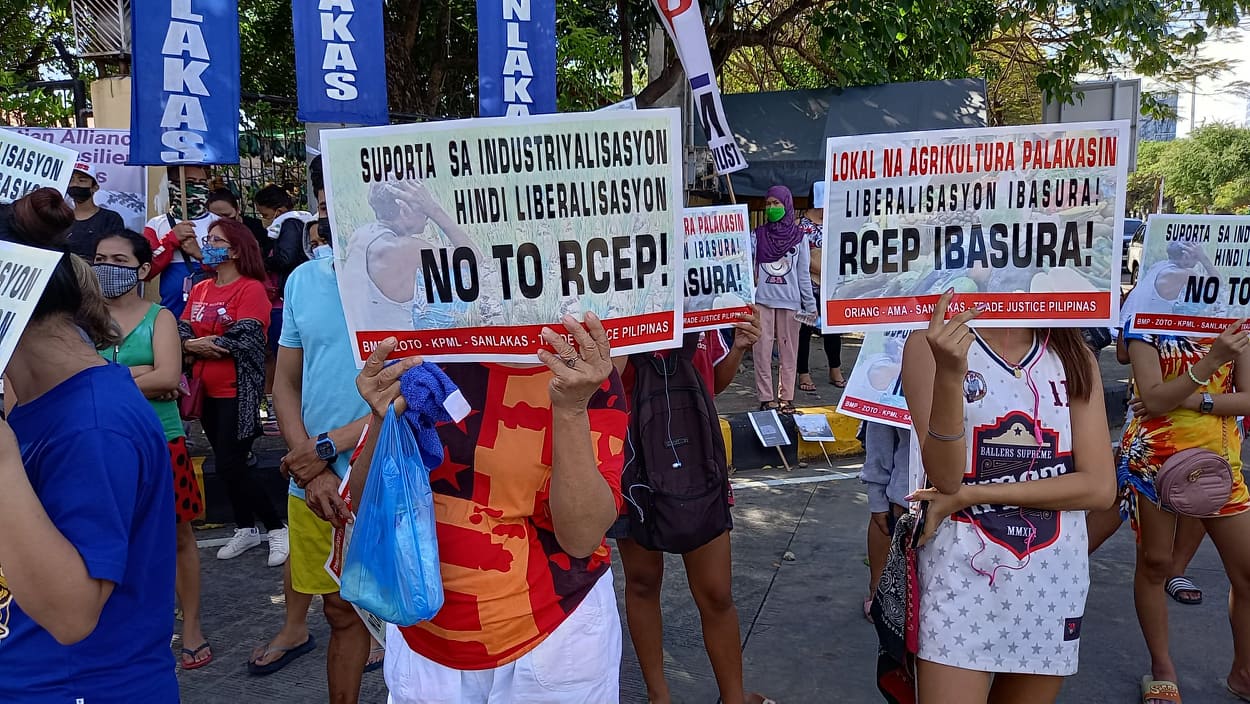

More than 100 activists led by AMA-SANLAKAS and SENTRO staged a protest at the Senate grounds to call on the Senate to reject the Regional Comprehensive Economic Partnership Agreement or RCEP ratified last year by President Duterte. January 31, 2022. photo courtesy of Sanlakas.
Trade Justice Pilipinas reiterates its call to the Senate to deny concurrence to the Regional Comprehensive Economic Partnership Agreement or RCEP.
We have been monitoring the RCEP negotiations for many years, and have issued many statements, intervening in whatever limited space available to us, raising and amplifying people’s concerns over the possible negative impact from this mega free trade and investment agreement.
As the Senate winds down its deliberations on RCEP, we reiterate the reasons for our opposition to the agreement:
- RCEP is an added burden in the time of the Covid Pandemic.
In our statement issued in November 2020 on the signing of RCEP in Hanoi, we underscored the following:
“It is unconscionable that RCEP will be signed in the time of an unprecedented health and economic emergency that has exacted a heavy toll on public health systems and the economies across the region, The Covid-19 pandemic and the global economic slowdown should have prompted a pause in these negotiations instead of the acceleration that happened. States should be made accountable for committing to new obligations under this agreement that would be detrimental to the public interest.”
Furthermore, in our submission before the Senate Committee on Foreign Relations dated October 2021, we stressed the concern raised by trade and health advocacy groups that RCEP – the text of which was concluded in 2019, before the pandemic – could severely constrain the policy space needed to effectively address the health and economic crisis. We asked that the government clarify the impact of rules under RCEP on these concerns. Government’s response was to brush aside these concerns with motherhood and myopic statements about how RCEP could drive post-Covid economic recovery efforts.
- RCEP will undermine policy space.
How FTAs like RCEP constraint policy space is evident in the current efforts to secure support for a TRIPS Waiver calling for a temporary suspension of certain obligations on intellectual property rights under the WTO. In a hearing early this year of the same Committee that deliberated on RCEP, on a proposal calling for the Philippine government to support the waiver, representatives from the Departments of trade, foreign affairs as well as the Intellectual Property Office (IPO) raised the concern that support for the waiver might ran counter to obligations under FTAs signed by the Philippines namely with the European Free Trade Association and RCEP. This demonstrates how obligations under these agreements could constrain policy space. Even agreements like RCEP that are not yet in force, are already limiting our policy options, causing a “chilling effect” on government actions.
Among the policies that could be deemed inconsistent with RCEP include those that are necessary to deal with the Covid-19 pandemic, such as price controls on Covid-19 test and medicines, grace periods for loan, rent and electricity payments; measures that are necessary to deal with other health issues such as tobacco control, and environmental issues.
- RCEP is an agreement forged by governments without people’s consent and support.
Issues over lack of transparency and meaningful participation have hounded these negotiations from day one. As a civil society report found, the RCEP negotiations failed the transparency and public participation test with no or little publicly available information on the state of negotiations, draft texts or key government positions; limited or token/ad hoc stakeholder engagement forums; limited ability for Congress or other public institutions to impact or influence the process; and on the other hand privileged role and access to information have been given to special interests and corporate/business groups
- RCEP will only deepen inequalities that already exist and were exacerbated further by the pandemic.
RCEP will further undermine the livelihoods of farmers, fishers, indigenous peoples and rural women, and threaten jobs for workers. We echo and support the position of over 80 stakeholders led by those in the agriculture and fisheries sector and workers questioning the wisdom of entering into another international trade agreement, and the push for further liberalization of the economy given the current state of agriculture and fisheries, and the inability of government to support local producers and strengthen our domestic sectors. Furthermore, the expected increase in imports in products like garments, footwear, plastics, electrical machinery and equipment, could further exacerbate our problems with jobs and employment, and could lead to a downward push on wages.
- RCEP will worsen our country’s trade deficit.
Government contends, citing studies by Cororaton and others that RCEP would lead to increased exports. On the issue of imports, it concedes that the agreement could lead to increased imports but argues that increased imports will be beneficial to the economy. It chooses to ignore other studies and expert opinions that argue in fact the opposite.
We have consistently cited the UNCTAD and Boston University study of Dr. Rashmi Banga et al., which looked at market access implications of RCEP on ASEAN based on the actual commitments made by RCEP participating countries.
With respect to exports, the report finds that only three countries experience marginal rise in exports post RCEP. Exports post RCEP rose by 1 percent for Indonesia and Thailand, and 0.07 % for Brunei. Based on the projections, the Philippines could see a 0.20% decline in exports resulting in a loss of export revenues amounting to over 100 million USD. Furthermore, the study shows that the Philippines will experience a fall in imports from all ASEAN countries but a rise in imports from China and Korea. We would expect a rise in imports in arms and ammunition, electrical machinery and equipment and plastics from Korea, and plastic, rubber, and clothing and textiles, footwear, glassware, machinery and mechanical appliances, and electrical machinery from China. Our import bill could rise by 148 million USD.
- Tariff liberalization can lead to substantial tariff revenue losses.
The report of Banga, et al estimates that the Philippines will lose around 58 million USD or 2.9 billion pesos. This money could support the vaccination of around 2 million more Filipinos or additional 1 million more PPEs for medical front liners. That money could be used to purchase new smartphones to support online learning for 725,000 students.
- RCEP’s agenda is skewed in favor of corporate interest.
The agreement contains provisions that would prohibit the use of performance requirements, and open the door for future measures that would increasingly expose States to corporate attacks against public policies and regulations.
Which side are you on?
Two sides have clearly emerged in the ensuing public debate on RCEP. On one side you have the government supported by big corporations arguing on the side of ambition. Their assertions highlight promises that the agreement will increase GDP, bring in more foreign investments, and signal to the world the Philippines readiness to further liberalize its economy.
On the other side you have farmers, fishers, workers, and small businesses who are arguing on the side of caution. These stakeholders are tired of these rosy projections. They have heard these lofty promises before but witnessed how the promised benefits from trade liberalization have not been delivered. The groups opposing RCEP are raising serious concerns over possible long term impacts of the agreement on livelihoods and jobs.
We commend the strong position taken by Senator Risa Hontiveros in her interpellation 36th Plenary Session of the Senate last January 26. More Senators have expressed their intention to raise questions in the period of interpellation, and we hope that the critical issues being raised would not fall on deaf ears.
Now is a crucial moment for the Senate. Tasked with the responsibility to concur or deny concurrence to international treaties and agreements entered into by the Executive, the Senate is duty-bound to exercise due diligence in scrutinizing RCEP. Now is the time for the Senators to make a clear stand on whether it supports the interest of big corporations, and concur with the Executive on RCEP based on motherhood statements and rosy projections? Or take the side of various stakeholders- farmers, fishers, workers and small businesses that have raised serious concerns about the threats to livelihoods and jobs.#
Contact: Trade Justice Pilipinas ℅ Joseph Purugganan, [email protected]/ Mobile/Whatsapp and Signal : 09175460319
This statement was first published on February 1, 2022 by the news outlet Rappler at this link here.









